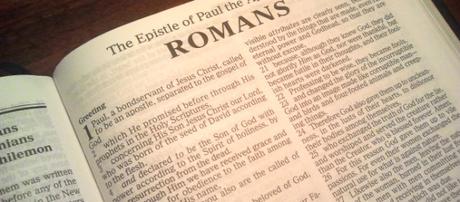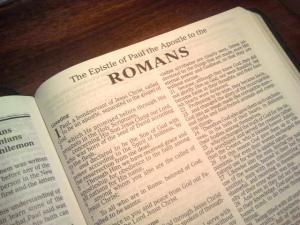 Jul
30
2015
Jul
30
2015
Romans – The Gospel of God (Part 25)
“First, I thank my God through Jesus Christ for you all, that your faith is spoken of throughout the whole world. For God is my witness, whom I serve with my spirit in the gospel of His Son, that without ceasing I make mention of you always in my prayers, making request if, by some means, now at last I may find a way in the will of God to come to you. For I long to see you, that I may impart to you some spiritual gift, so that you may be established— that is, that I may be encouraged together with you by the mutual faith both of you and me.” Romans 1:8-12
In our last Romans study, we looked at what it means to thank God “through Jesus Christ” and the great truth that Jesus is our great Mediator and Advocate. Christianity truly is a one-of-a-kind worldview.
We now turn to Paul’s statement that the “faith” of the Roman Christians was “spoken of throughout the whole world.” That’s an amazing statement for the Apostle to the Gentiles to make. Why would he say that at the beginning of this letter? What did Paul have in mind as he wrote those words? What did the Roman believers think about what he wrote?
Spiritual Insight
 Paul is ‘thankful’ to God for the Roman believers – “I thank my God through Jesus Christ for you all …” Paul had many reasons for saying that, even though he had not met them yet (Romans 1:13; 15:22). That raises the question of how these Christians became Christians if not through the ministry of Paul and how he would have known about them.
Paul is ‘thankful’ to God for the Roman believers – “I thank my God through Jesus Christ for you all …” Paul had many reasons for saying that, even though he had not met them yet (Romans 1:13; 15:22). That raises the question of how these Christians became Christians if not through the ministry of Paul and how he would have known about them.
One possibility might be that some of the “visitors from Rome” (Acts 2:10) who were in Jerusalem on the day of Pentecost may have believed Peter’s message, become followers of Christ, returned to their homes in Rome, and “continued steadfastly in the apostles’ doctrine and fellowship, in the breaking of bread, and in prayers” (Acts 2:42). In other words, they continued as followers of Christ after they left Jerusalem and headed back home.
Another possibility might be that Jewish and Gentile followers of Christ journeyed to Rome from other parts of the world since it was the center of the great Roman Empire (see Map). Some of those people may have become Christians through Paul’s ministry in other parts of the world (see personal greetings from Paul in Romans 16) or been influenced by Christians who knew Paul.
Some may have visited for a brief time in Rome and shared the Gospel of Christ. Others may have taken up residence in Rome and helped build the church that Paul addressed in his letter. Paul mentioned several assemblies of Christians who met in houses in Rome (e.g. 16:5, 10, 11, 14, 15), so there may not have been any single church ‘building’ at the time Paul was writing his letter to the Romans. Rome was a big city with a large population, so Christians may have strategically placed themselves across the area to impact more people.
Paul was thankful for the Christians in Rome and wrote “that your faith is spoken of throughout the whole world.” The world of the Roman Empire included much of what we now know as Europe, Britain, North Africa, the Near East and Middle East. Rome was the largest and most important city of the world at that time. Population estimates range from one to four million people with a large percentage made up of poor people and slaves.
The Greek of the second half of Romans 1:8 reads – οτι η πιστις υμων καταγγελλεται εν ολω τω κοσμω. A literal translation – “because the faith of you is being announced in all the world.”
The context demonstrates the correct understanding of the word pistis (faith) as pertaining to Christianity. Paul has already described himself as a “bondservant of Jesus Christ, called to be an apostle, separated to the gospel of God .. concerning His Son Jesus Christ our Lord.” (Romans 1:1-3) He described the recipients of his letter as “beloved of God, called to be saints.” (Romans 1:7)
People who spoke Koine (Common) Greek in the 1st century understood the word pistis to mean ‘strong trust.’ The idea was of someone being ‘persuaded’ to come to trust. Pistis came from peithô which meant ‘to persuade of what is trustworthy, to have confidence.’ Being a Christian has nothing to do with ‘blind’ faith and never did. ‘Faith’ in Jesus Christ is about having confidence in the evidence of the truth of the Christian Gospel. Christians ‘cling to, rely on, trust with confidence’ the Gospel because of the evidence for Christianity.
Historical Insight
History may help us understand a bit more about why Paul wrote that the ‘faith’ of the Roman Christians “is being announced in all the world.”
“After these things Paul departed from Athens and went to Corinth. And he found a certain Jew named Aquila, born in Pontus, who had recently come from Italy with his wife Priscilla (because Claudius had commanded all the Jews to depart from Rome); and he came to them.” Acts 18:1-2
Dates for Paul leaving Athens and traveling to Corinth range from 50 – 52 AD. That’s important to note since Roman Emperor Claudius (41 – 54 AD) is known to have expelled Jews from Rome after several years on the throne. Roman historian Gaius Suetonius Tranquillus (69-122 AD) wrote about the expulsion in The Lives of the Twelve Caesars (Divus Claudius 25).
“Since the Jews constantly made disturbances at the instigation of Chrestus, he expelled them from Rome.”
It may be that the Christian Gospel concerning Jesus being the Jewish Messiah caused disturbances among Jews in Rome, which led Claudius to expel Jews from Rome. The fact that a Roman historian wrote about the event decades later may support one aspect of Paul’s statement that “your faith is spoken of throughout the whole world.”
Aquila and Priscilla left Rome and traveled to Corinth where they met Paul and began working with him. Claudius died in 54 AD and Nero became emperor. Historians believe Nero was more favorable to the Jews and treated them better (see Britannica article about Nero). Paul is believed to have written his letter to the Romans about two years later (56-57 AD) from Corinth and his request to “Greet Priscilla and Aquila, my fellow workers in Christ Jesus” and “the church that is in their house,” indicates they had most likely returned to their home in Rome.
In the next part of our study, we will look at Paul’s intention to visit the Christians in Rome and what he hoped to accomplish there.
“Scripture taken from the New King James Version®. Copyright © 1982 by Thomas Nelson, Inc. Used by permission. All rights reserved.”

